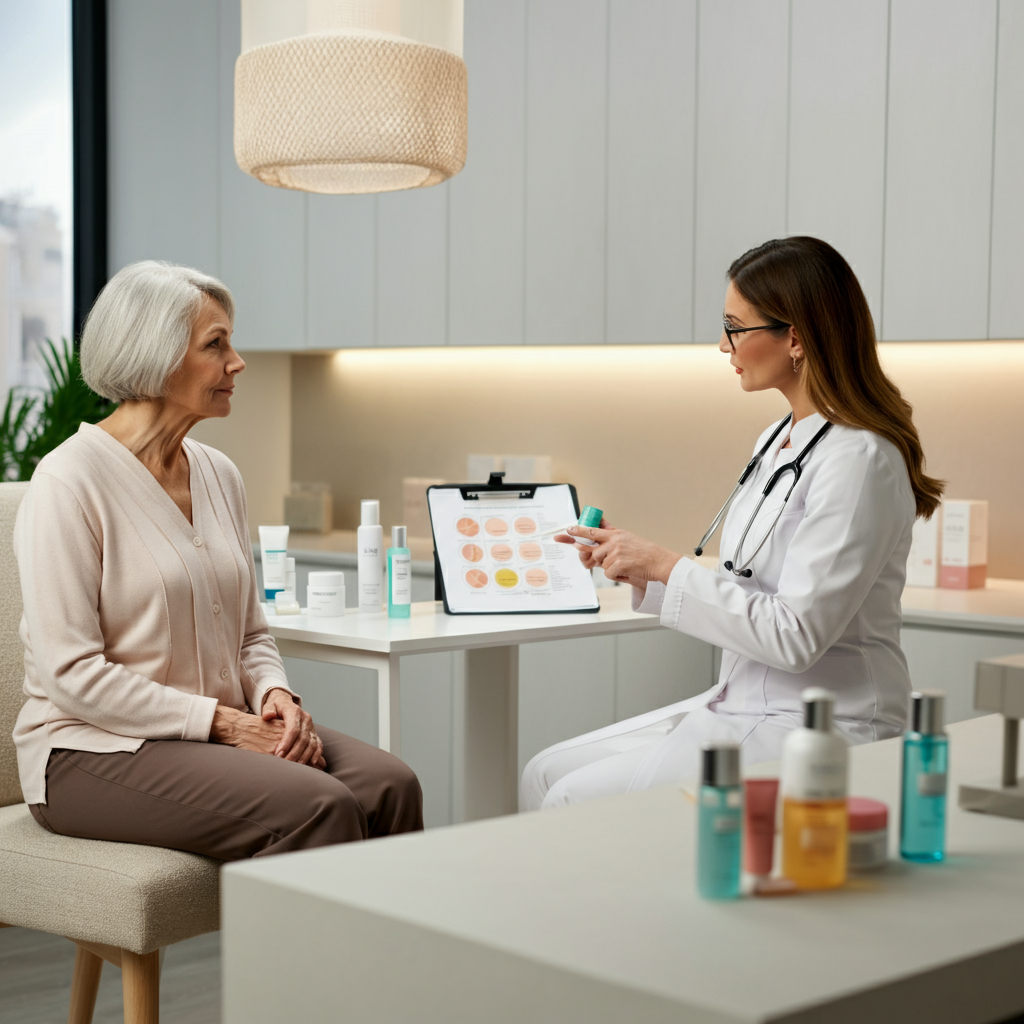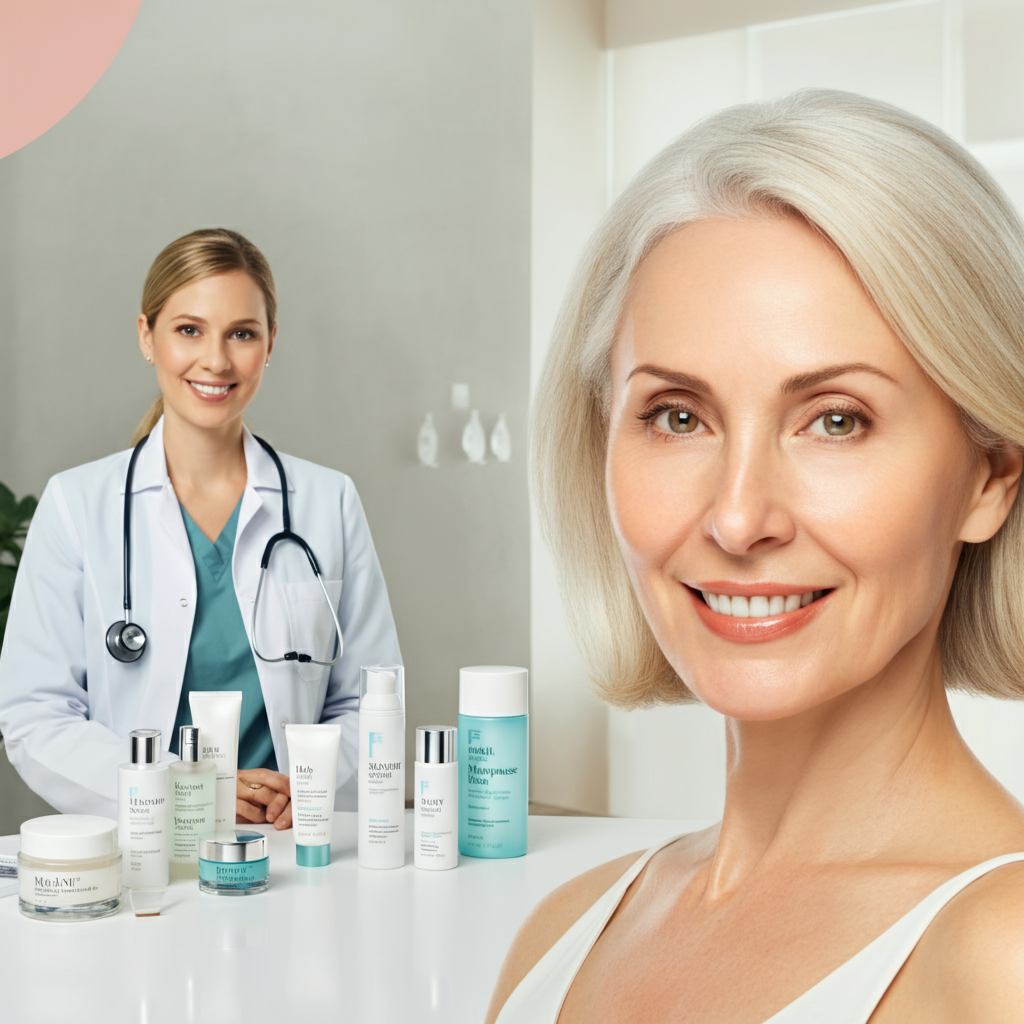Menopause brings with it many changes, and while some are expected, others can take you by surprise. One of the most noticeable changes for many women is the shift in their skin. From unexpected acne flare-ups to dryness and sensitivity, these changes can leave you wondering if your skin has a mind of its own. But you’re not alone, and the good news? There are ways to adapt.
This guide dives deep into how menopause affects the skin and includes tips from top dermatologists to help you nurture your skin through this new stage of life. Expect advice on treating hormonal acne, managing dryness, supporting elasticity, and much more. Plus, we’ll share personal stories and real-world examples to help you feel confident in conquering these skin changes.
Introduction to Menopause and Skin Changes
Menopause is a natural biological transition that typically begins in your late 40s or early 50s. During this time, your ovaries stop producing eggs, and estrogen levels drop significantly. While menopause affects various bodily functions, its impact on the skin is often underestimated.
Estrogen plays a crucial role in maintaining skin hydration, elasticity, and overall health. When estrogen levels decline, the skin reacts in noticeable ways. Here’s a quick glimpse into the primary changes many women experience during menopause:
- Increase in dryness due to reduced oil production.
- Loss of elasticity and firmness as collagen production slows.
- More visible fine lines and wrinkles.
- Occasional breakouts or what we commonly refer to as hormonal acne.
These changes might seem overwhelming, but proper skin care adjustments can help you maintain glowing, healthy skin.
Understanding Hormonal Acne
Hormonal acne during menopause can feel particularly frustrating. After decades of enjoying clear skin, many women report an unexpected resurgence of breakouts. But what causes this?
During perimenopause and menopause, your body’s decreasing estrogen levels create an imbalance with testosterone. This hormonal shift can trigger sebaceous (oil) glands to produce excess oil, clogging pores and leading to acne. Hormonal acne tends to appear as deep, cystic bumps along the jawline and chin, though it can persist elsewhere.
While hormonal acne may be stubborn, it’s not untreatable. Keep reading for dermatologist-approved tips to manage it.
Expert Dermatologist Tips for Managing Menopausal Acne
Treating hormonal acne requires a targeted approach. Here are some dermatologist-approved strategies that have proven effective:
1. Cleanse Gently and Effectively
Use cleansers containing salicylic acid or benzoyl peroxide to help unclog pores and reduce inflammation. Products like CeraVe Acne Foaming Cream Cleanser are designed for sensitive, acne-prone skin.
2. Add Retinoids to Your Routine
Retinoids (derived from Vitamin A) are excellent for improving cell turnover, treating acne, and boosting collagen. Over-the-counter options like Differin Gel can help, but consult your dermatologist for stronger prescription retinoids if needed.
3. Balance with Non-Comedogenic Moisturizers
Don’t skip moisturizer just because you’re experiencing acne. Consider lightweight, oil-free options such as Neutrogena Hydro Boost Gel Cream to restore hydration without clogging pores.
4. Avoid Over-Exfoliating
While it’s tempting to exfoliate aggressively, this can worsen irritation. Stick to mild exfoliating products once or twice a week. Glycolic acid-based masks or peels are excellent options.
5. Explore Hormonal Treatments
Talk to your healthcare provider about hormone replacement therapy (HRT) or medications like spironolactone, which can help regulate testosterone levels and reduce acne.
Lifestyle Adjustments to Support Skin Health
Sometimes, adjusting your lifestyle can complement your skincare routine and amplify results. Here are some key tips that dermatologists recommend:
1. Prioritize a Skin-Healthy Diet
Focus on foods rich in antioxidants, omega-3 fatty acids, and vitamins. Think berries, salmon, avocados, nuts, and leafy greens. Limiting dairy and sugar could also reduce acne flare-ups for some women.
2. Stay Hydrated
Dryness during menopause often starts from within. Drink plenty of water to support hydrated, plump skin.
3. Sleep and Stress Management
Chronic stress and lack of sleep can accelerate skin aging and trigger acne. Incorporate relaxation techniques like yoga or meditation, and aim for 7–8 hours of sleep each night.
4. Exercise Regularly
Physical activity boosts circulation, delivering oxygen and nutrients to your skin while promoting overall radiance.
5. Incorporate SPF Daily
Menopausal skin is thinner and more susceptible to sun damage. Use a broad-spectrum sunscreen with at least SPF 30 every day. Brands like EltaMD are highly recommended by dermatologists.
Addressing Other Skin Changes During Menopause

Beyond acne, menopausal skin requires attention in other areas, such as hydration, sensitivity, and elasticity. Here’s how to tackle these concerns:
Combatting Dryness
Increase hydration with ceramide-enriched moisturizers or hyaluronic acid serums. Look for products labeled fragrance-free to avoid irritation.
Reducing Sensitivity
Avoid products with alcohol, sulfates, or artificial fragrance. Opt for soothing cleansers and moisturizers with calming ingredients like aloe vera or chamomile.
Supporting Elasticity
Antioxidant-rich serums containing Vitamin C or peptides can improve collagen production and reduce the appearance of fine lines. Consider trying SkinCeuticals C E Ferulic, a favorite among dermatologists.
When to Seek Professional Help
While over-the-counter products and lifestyle changes are beneficial, certain signs mean it’s time to consult a dermatologist. Seek professional guidance if you experience:
- Severe or painful cystic acne.
- Unbearable sensitivity or persistent redness.
- Noticeable changes such as new moles, spots, or lesions.
Specialized treatments like chemical peels, microneedling, or laser therapy may provide better results under expert supervision.
Real-Life Stories and Examples
You’re not alone in navigating these skin changes. Take Erica, a 52-year-old who battled dryness and hormonal acne for years. While moisturizer helped with hydration, transforming her skin required adding Vitamin C serums and switching to salicylic acid cleansers.
Or Janet, who struggled with overly sensitive skin post-menopause. After switching to gentle, fragrance-free products and receiving IPL laser therapy for redness, her confidence was restored.
People Also Ask
Q: Can menopause cause skin problems like acne or dryness?
Yes, menopause can lead to an increase in acne due to hormonal changes and dryness because of reduced oil production.
Q: What is the best skincare product after menopause?
The best products are those that address hydration (like hyaluronic acid serums) and skin elasticity (like retinoids or Vitamin C serums).
Q: Does diet affect menopausal skin?
Absolutely! A diet rich in omega-3s, antioxidants, and vitamins can support skin health. Limiting dairy and sugar may help with acne.
FAQs
How do I know if my acne is hormonal during menopause?
Hormonal acne often appears as deep, cystic bumps along the jawline, chin, and lower face.
Can lifestyle changes improve my menopausal skin?
Yes! A balanced diet, hydration, stress management, and daily SPF can significantly improve skin health.
What’s the ideal skincare routine during menopause?
The basics include gentle cleansing, day and night moisturizers, SPF, and active ingredients like retinoids or Vitamin C serums.
Empower Your Skin Journey
Navigating skin changes during menopause doesn’t have to be overwhelming. Armed with the right information and products, you can maintain vibrant, healthy skin beyond menopause.
For additional guidance, consult a dermatologist who can tailor a skincare plan to meet your specific needs. Remember, you’re more than your skin changes. Confidence shines brighter than any skincare product.
